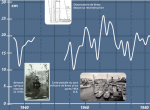Jean Claude
Junior Member
- Joined
- Jan 2, 2009
- Messages
- 2,612
- Location
- Centre FRANCE
- Aircraft
- I piloted gliders C800, Bijave, C 310, airplanes Piper J3 , PA 28, Jodel D117, DR 220, Cessna 150, C
- Total Flight Time
- About 500 h (FW + ultra light)
Juergen, my post #4 shows mostly 40 years of non-warming despite the industrial explosion (from 1940 to 1980) The incomplete datas can not be invoked during this period.
Records of sea level to Brest in France gives the same information:

. http://refmar.shom.fr/image/image_ga...=1504525089431
IPCC want abolutely explain the climate warming by CO2, strangely assuming a constant Sun, which we know yet variable by its unpredictable eruptions.
Records of sea level to Brest in France gives the same information:

. http://refmar.shom.fr/image/image_ga...=1504525089431
IPCC want abolutely explain the climate warming by CO2, strangely assuming a constant Sun, which we know yet variable by its unpredictable eruptions.
Last edited:



